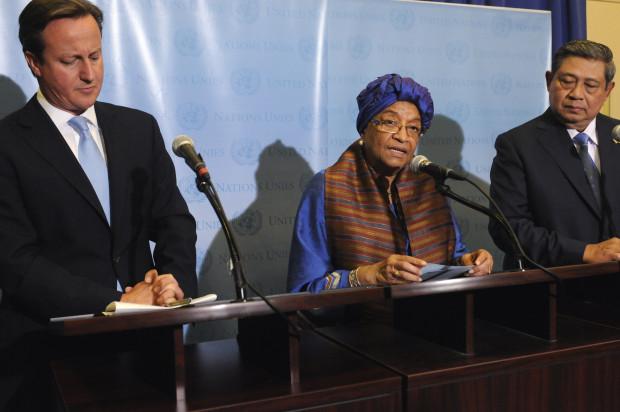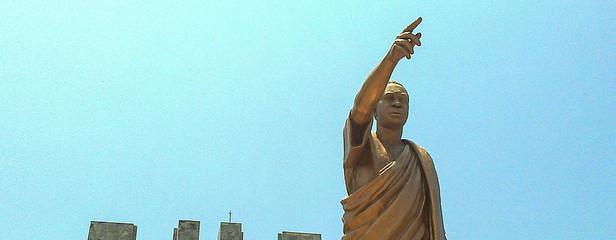Ebola outbreak highlights Liberia’s crisis of development policy – By Ashoka Mukpo

President Ellen Johnson Sirleaf is highly respected internationally, but her government’s successes are less evident for the people of Liberia.
Before the 2011 presidential election in Liberia, I was relaxing on a beach in Monrovia when a man walked by wearing a t-shirt with a candidate’s face on it. We made eye contact, and I asked him, “Do you think he’s going to win?” Not skipping a beat, he smirked back at me and said, “You tell me, you are the ones who choose.”
Three years later, Liberia is in the midst of its worst crisis since fifteen years of brutal civil war came to an end a decade ago. Ebola cases are mounting, the health system is all but broken, and last week security units fired shots at people who were attempting to break a quarantine that had overnight been imposed on West Point, a neighborhood of over 75,000 people. A 15-year-old boy was killed in the tragic incident, sparking outrage and sadness in a country whose society has already been torn by the epidemic.
Hopefully, rich countries will soon pivot to a more proactive effort to save lives in West Africa, and the outbreak will be brought under control. Once the health crisis has settled down, however, it will be wise to admit that this calamity has been a crisis of Western-led “development” practices as much as it has of the fragility of African health care. In the early days of Ebola’s spread in Liberia, many refused to believe that it was real, dismissing the disease as a fabrication. This begs a crucial question: why were so many people unwilling to trust an elected government that repeatedly warned them of Ebola’s dangers?
On paper, Liberia seemed like a success story two months ago. Foreign investors had committed to spending nearly 20 billion dollars on extractive projects, Chinese companies were paving roads across the country, and the all-important GDP growth rate had been over 7 percent in six of the last ten years. As President Ellen Johnson Sirleaf told Katie Couric of Yahoo News, “This is the same leadership that led a country from being a failed state to one that had some of the most promising growth recorded in Africa.”
During my time in Liberia, I witnessed a much more complicated dynamic playing itself out. Most Liberians saw their government as deeply corrupt and unaccountable to its citizenry, particularly those at the low end of the social ladder. This was not a mythology spread by disgruntled malcontents; small business owners I know spoke of paying 10 percent kickbacks to government ministers for service contracts, and last year Human Rights Watch released a report detailing pervasive corruption in the country’s police force.
Liberia has always been a two-tiered system. In its early days, the descendants of slaves who were helped, and at times forced, by the American government to relocate to Africa lorded over the country’s indigenous peoples. Higher education, civil service posts, and well-paid jobs were restricted to “˜settler’ families, creating a dynamic of exclusion and patronage that culminated in a series of horrific wars in the 1990s. The post-war years were supposed to have represented a break with that past. The government of former World Bank economist Ellen Johnson Sirleaf promised to usher in a new egalitarian age, and foreign donors rushed to pour money into reconstruction and economic initiatives.
Somewhere along the way, old problems crept back into Liberian politics. Transparency International labeled the country the most corrupt on the planet, and an audit commissioned by an extractive watchdog agency exposed that nearly all its resource contracts were signed without following proper procedure. Civil society groups documented widespread abuse of legal loopholes in logging contracts, which were signed by high-level officials. This slide into poor governance occurred in the presence of nearly every NGO, aid agency, and donor on earth. Most of them seemed to Liberians to be looking the other way – carelessness that was often taken as complicity.
Meanwhile on the street, Liberians sat in the hot sun, hawking petty goods while aid workers and government officials drove to and from high-walled compounds in air-conditioned jeeps. Now, the social fabric in Liberia has been exposed as being deeply damaged. This damage cannot all be attributed to the wounds of war. The response to the Ebola outbreak by many Liberians has laid bare a troubling and widespread sentiment of cynicism towards the government. Sadly, Liberia’s poor have good cause to have adopted a mistrustful stance towards its elected representatives and the international community that backs them.
Despite the high growth rates achieved by the government, a close look reveals troubling policies that have made the lives of the poor seem like a low priority. Houses have been demolished on behalf of wealthy elites, communal forest land was handed out to foreign investors without local consultation, and the legislature has repeatedly refused to pass a “˜Decent Work Bill’ that would have set a minimum wage. In an effort to “˜beautify’ Monrovia, a ban on petty trading stalls was enacted, enforced by riot-gear clad police who could often be seen chasing market women through the city’s streets.
Across Liberia, a cancerous idea has taken root: “We are on our own.” Foreigners are often surprised to discover that President Johnson-Sirleaf is unpopular amongst many Liberians, despite her international accolades. Even more shocking is the discovery that Charles Taylor remains widely admired. A Liberian UN employee once claimed to me that if Taylor were to return to Liberia, he would receive “80 percent” of the vote in a special election. The reason? “People say Taylor shared the spoils.”
The long-term effects of the Ebola outbreak in Liberia are impossible to predict, but they are certain to be profound. Economic activity is grinding to a halt and the price of food has begun to climb. In a country where a large majority of the population lives on less than two dollars per day, an increase in food costs is a matter of overwhelming consequence. The great tragedy is that if Liberians had been more cooperative with government efforts to control Ebola’s spread in its early days, however haphazard those efforts may have been, the crisis would have been far less extreme. For the global development community, pointed self-reflection on why so many Liberians do not trust their government is an absolute necessity.
To begin, the top-down economic strategy that emphasized economic growth above all and which failed to consider the social context in which that growth was taking place has proved to be deeply flawed. Even if the outbreak had not exposed the social fractures that lay behind the country’s progress, grievances and mistrust bubbling in places like West Point would have eventually erupted. Development partners must do a better job of insisting that issues like corruption, disparate access to justice, land tenure, and housing rights rise to the top of the agenda. In addition, bottom-up accountability mechanisms that give average citizens a greater role in policing officials and determining how and where money is spent are desperately needed.
No amount of GDP growth or foreign investment is likely to produce a functioning, stable society without the perception that all its members are equally valued. While growth is important, the Ebola outbreak has showed that if it does not translate to a sense of inclusion, hard-earned progress can be undone nearly overnight. Nobody could have planned for Ebola, but for years the country’s partners stood mostly mute while frustration rose in the streets and the government became widely resented.
Liberia’s poor believe that the international community “chooses” their leaders, and then shrugs when those leaders treat them callously. In the aftermath of the ongoing Ebola tragedy it will be necessary to combat that view, and to ensure that development interventions are geared towards building trust between Liberians and their government, even if it means picking a fight with politicians.
Ashoka Mukpo worked in Liberia for the past three years with a civil society organization.







Agree absolutely with this article – what is surprising is the way in which this local discontent with the President and government has been missed or dismissed by international donors, despite repeated and glaring evidence of corruption at the highest levels. Just why this is so is another question.
One important additional point to note is the way that the governance failures of the past ten years have contributed to the weaknesses of the country’s public health system and its inadequate response in tackling the outbreak.
Let’s just hope that the huge funds which should now be forthcoming to fight ebola are implemented and monitored effectively, but this is far from guaranteed.
As a former Liberian Country Director advancing Civil Affairs under aegis of USAID and as a former Civic Civil Electoral Governance Advisor with UNMIL I am most sensitive to the concerns raised by this sensitive intelligent Aid Worker who in his commentary raises concerns and issues regarding ‘Aid’ which are indeed ordinal.
International Assistance is corrosive and subject to many externalities not relevant to the national local conversation. My belief is that international assistance must be grounded and administered by National Citizens with the Internationals participating as Advisors [only] as mistakes made in Aid design provide the Nationals a learning curve.
My article below I believe expresses germane ontological aid/assistance considerations.
Foreign Aid: The Politics, Accountability, Democracy & Reform http://read-online.org/archives/2657
People who write about Liberia’s history need to do more research. Higher education, civil service posts, and well-paid jobs were never restricted to ‘settler’ families. These were all open to anyone who had the means, including many natives who were adopted and educated by settlers. The settlers and their descendants were more likely to be educated and employed because they came to Africa as products of a western society. On the other hand most Natives preferred to remain in tribal societies practicing their cultural traditions. Efforts to bridge this gap began in the mid 1900s. In the 1920’s a Native man served as Vice President of Liberia (H. Too Wesley) and there were Natives serving in the Legislature. President C.D.B King himself was not an Americo-Liberian, his family were immigrants who came to Liberia directly from Nigeria. By the 1970s there were many people of native background serving as high level Government Officials. The 1980 coup was influenced by the popular uprisings that were plaguing Africa in the 70s (see timeline of coups that took place in Africa). The 1990 war was a result of the dictatorial policies and practices of the Doe led Government.
I remember Liberia from my days as a World Bank projects specialist in the late 1970s. The divide between the elite “settlers” mentioned in the article, the Johnsons, the Freemans, the Tubmans and the “natives” was as sharp then as it is today. Sirleaf Johnson was for a period the Finance Minister then, the darling of Bretton Woods institutions and western donors as she is today. The corruption and sleaze was as pervasive then as now and had been a hallmark of this fractured society— there is no better portrayal of this than in Greene’s travelogue: Journey without Maps.
Forty
Forty years ago , the shady deals were made by the local elites with European and American interests, now it is with Chinese and Asian interests. As Ashoka points out, the fundamentals remain unchanged, only the actors have changed
There used to be a small settlement between Robertsville and Monrovia , it went by the name of Smenotay. The name had stuck from the time Allied servicemen were based in Robertsfield during the Second World War. The denizens of this settlement had smelt but not tasted the benefits they were promised but never received for the pleasurable services they rendered. And hence the name ,’ Smell No Taste’ From the perspective of the common Liberian, this would be an apt epitaph for the much touted economic growth and development foisted on Liberia by high minded but misguided development functionaries . But then is Ashoka’s tale of Liberia that different from what is transpiring in the two Sudans, DRC, CAR and one could go on and on. That is the tragedy of Africa .
While the international community and investors look at financial aid to developing countries what is equally crucial is the founding and firming the infrastructure under which these countries can thrive. Management is seriously lacking and therefore must be addressed equally if the investments are to succeed.
Asif Faiz,
“Smell No Tatse” was named because of the Allied Service men. The residents of that community could smell but not taste the benefits provided to the American soldiers by the US Government. The American soldiers were there because Liberia was America’s ally during World War II, they were not there to provide aid or render services. The residents of that community were not entitled to those benefits.
After reading through comments above, I hope We can all conclude that Roger is infact an Americo-Liberian. Or a very naive westerner. I’m South African, and spent 14 years in Liberia. From 1975-1989. Who in their right mind would “choose” to remain uneducated or oppressed? And That’s exactly what the native were, oppressed by the Americo-Liberians. Doe was seen as the hero for most Natives, which I remind you, were the majority group in the country. I witness the development and equality Doe brought to the country. I left due to through civil war of course. I was sadden to discover what had happend to Doe. I’m almost certain that he would of finish off his term and allow another election. Doe was only in office for 2 terms I never understand why the Amerigo Liberians would refer to him as a Dictator. A native couldn’t even vote or run for office before Doe. Anyways, I’m surprised to See that the social dynamics reverted back to what it was during Tubman time. It’s sad. After this Ebola rubbish, It’s time for the natives Liberians to join together and demand proper representation. United you stand, divided you fall.